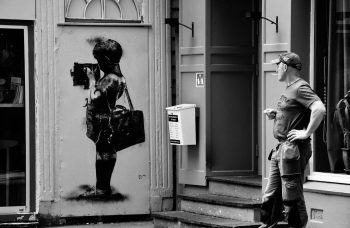Artist Steve Locke recently turned to the public to help fund a memorial he has planned for right in front of Boston’s famed Faneuil Hall. Locke, who has lived and worked in Boston for over three decades, hopes to acknowledge those who were sold as slaves outside of Faneuil Hall through a large-scale installation. The artist got the idea when he was named one of Boston’s seven artists-in-residence last year and asked, along with the other artists, to consider racial equity and the resilience within Boston.
Locke’s vision will consist of a 16-foot by 10-foot bronze plate that will sit into the ground outside Faneuil Hall marking the footprint of the auction block that once sat there and saw the sale of countless slaves during the 19th century. The plate would be consistently heated to 98.6 degrees Fahrenheit throughout the year to make sure those who visit the hall are reminded of the people who were bought and sold. The heat will be felt during the warmer months but also keep the monument clear of snow during the harsh Boston winter, much like Horst Joheisel’s Monument to a Monument (1995) at Buchenwald, a Nazi concentration camp in Germany. On the bronze plate, there will be an engraving of the transatlantic triangular trade route, which was used in the transportation of slaves during the 18th and 19th century. That trade route also benefited the namesake and the man who funded Faneuil Hall.

Peter Faneuil was a wealthy merchant who made his money through the slave trade. In 1743, he built Faneuil Hall, which ranks high amongst Boston and US landmarks, to provide a place for the public and has seen numerous historic events, one of which being the bolstering of the slave trade in the US. As recently as 2017, Bostonians and others have fought to have the building renamed as to not glorify the merchant slave trader to no avail.
If realized, Locke’s artwork will allow Faneuil’s lesser known side to be present alongside his physical mark left on the city. Locke calls Faneuil’s history an ‘open secret’ but, at the hall, there isn’t any indication as to how Faneuil made his fortune. ‘So, in a very simple way,’ said Lock to artnet News, ‘I just wanted to make a gesture that linked that edifice to the man and how he made his money.’ To do so, though, he had to turn to crowdsourcing because the city has no art fund to help fund such projects, despite having the backing of Boston’s mayor, Marty Walsh, among others.
So, last week on Juneteenth, the US holiday marking the end of slavery in the US on June 19th, 1865 after the Confederacy fell, Locke launched his kickstarter to raise $30,000, the amount needed to make preparations, including research and prototypes, for the project. The entire finished monument is estimated to cost around $300,000, though. To help cover funding, Locke has been promised $150,000 for the project in the form of a matching grant from The Browne Fund if he is able to raise the other $150,000 required. Just a week since it began, the kickstarter has garnered nearly two-thirds of the initial funds to begin the work. If all goes accordingly, he plans to unveil the monument on Juneteenth, 2020.
‘I think the era of heroic statuary is over,’ says Locke. ‘We think that the function of memorials is to glorify. It’s not. The role of the memorial is to indict. It’s to say, this happened here, and we’re never going to forget it.’
Edited June 26th for clarity.





